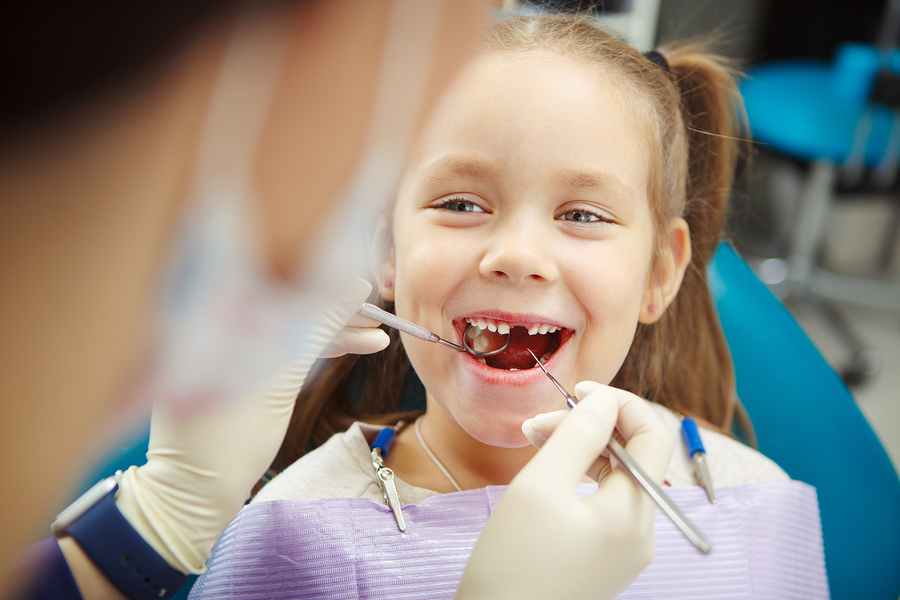Remember being scolded for sucking your thumb?
You mightn’t have realised at the time, but your parents were saving you from a habit that could have lifelong implications on your oral health!
Thumb sucking is natural behaviour for kids at a certain age. All parents know that babies have an instinctive urge to suck on things. And with the thumb being so close, it’s the most common candidate by default.
And while we don’t want to discourage kids from participating in a natural habit, letting them suck their thumbs past a certain age can cause numerous problems to the oral health of the child.
The effects of thumb sucking
Many parents may ignore this habit, dismissing it as normal behaviour or chalking it down to their children being late bloomers.
Others ignore it since it keeps their children occupied. Any parent knows that the moment their first child arrives, all your plans and carefully thought-through strategies go out the window in favour of “whatever works”!
But make no mistake: if your child keeps sucking their thumbs long after the typical age in which they stop, they’re at a greater risk of problems with their oral and emotional health.
Here are some of the side-effects that thumb sucking can bring about in your child if it isn’t stopped immediately.
Please note that there is no “right” or “wrong” time for a child to stop sucking their thumb. Research is varied, but generally, we discourage thumbsucking after the age of 5 or 6. Each child is different, though!
Thumb sucking can damage their teeth and mouths
While thumb sucking may temporarily ease the pain and itchiness during teething, the repetitive pressure of the thumb on the roof of your child’s mouth, jawbone and especially teeth can negatively impact the development of their teeth.
This can result in problems such as:
- Overbite
- Underbite
- Misaligned teeth
- Creation of a tongue thrust whilst swallowing
Additionally, thumb sucking may have a serious effect on your child’s palate (the roof of the mouth), affecting their bite.
Many kids press on their palate when they suck their thumbs – the palate can develop high and narrow in shape as a result, or become extra-sensitive.
Tongue thrusts can promote under or overbites, which may continue because of the thrust even after thumb sucking.
Each may need dental treatment in the future to fix, and or speech therapy. This can be drawn out for your child, expensive and time consuming – reduce the risk of this happening by breaking the habit early.
The thumb carries germs and bacteria
Let’s face it: kids love touching things, and will lay their hands on anything they can find.
As a result, dirt, germs and bacteria cling to their thumbs and fingers.
Young kids don’t know (nor care) about good hygiene habits just yet.
Combine that with thumbsucking, your child’s habit could contrirbute to illness.
Speech problems
Frequent thumbsucking while a child’s permanent teeth are growing is known to lead to speech impediments in many kids.
In particular, thumbsucking can cause children to develop a lisp, a speech defect where letter s is pronounced like th in thick.
Thumbsucking can push teeth out of their normal position, interfering with the proper pronunciation of words. It can also promote a tongue thrust whilst swallowing.
This can delay proper speech development in kids by building bad habits and forcing them to overcompensate.
Not to mention, it can potentially make your children a target for bullying.
How thumbsucking causes ear infections (yes, you heard that right!)
Believe it or not, thumbsucking can even lead to ear infections!
Here’s how it works: sucking your thumb builds pressure in your mouth. Oftentimes, this can spread beyond the mouth and throat to the middle ear.
The result? Ear infections.
How to stop thumb sucking in your children
Like anything involving kids, stopping them from sucking their thumbs isn’t as easy as just saying “no, it’s not good for you”.
After all, any parent knows that getting the kids to do something they don’t want can be challenging, to say the least!
Breaking a thumb sucking habit (and doing it properly) is an art. If you’re struggling to break your kids’ habit, here are some pointers you can consider.
Tip 1: never nag or punish
Unlike an adult, kids wear their emotions on their sleeves. If they feel upset, they’re going to throw a tantrum or cry.
Avoid punishment to ensure your kids don’t feel discouraged or that they are bad or wrong for sucking their thumb. Thumbsucking is an instictive habit, after all. It’s only when it reaches a certain age that it becomes most problematic.
Tip 2: instead of punishment, use rewards
It’s a commonly accepted idea in child psychology that when it comes to children, reward is more effective than punishment.
This isn’t a hard-and-fast rule, but more often than not, it tends to be the case.
With that in mind, rewards are your main in your fight against thumbsucking. Be generous with praise – every time they refrain from sucking their thumb, be sure to compliment them for it.
And if they make it for a long stretch without sucking their thumb, consider giving them a prize such as a snack or toy.
This teaches them to associate not sucking their thumbs with rewards and motivates them to drop the habit of their own volition.
Similarly, associate breaking the habit with growing up – little kids love being called “big kids” or “grown-ups”, and similarly, love being told that they’re not a baby anymore!
Tip 3: explain the effects of thumb sucking
Young kids are a lot smarter than many adults give them credit for – any parent knows this.
As such, it’s worth sitting your children down and explaining in terms they can understand how thumbsucking can have negative consequences.
You mightn’t think this is the case, but you might be surprised by how much of this your kids take on and internalise!
Tip 4: eliminate sources of stress
Some kids suck their thumbs whenever they’re stressed – think of it as a kid’s version of chewing your fingernails.
By minimising sources of stress, anxiety, restlessness and insecurity, parents can subsequently minimise thumbsucking.
Tip 5: cover their hands with socks or mittens
It might sound obvious – but it works!
That’s because many chronic thumbsuckers do it unconsciously in their sleep. By covering their hands in socks or mittens, you make the act of thumbsucking a lot more difficult.
And if your child is one who only sucks their thumb in their sleep, this could be a great way to break the habit.
Tip 6: visit a child dentist to learn more how to stop thumbsucking
Your local dentist looks at a lot more than just teeth – they also look after your overall oral health too!
Seek help from a team of dental professionals can help you understand and discourage your child’s thumbsucking habit. Additionally, they can even prescribe orthodontic devices if other measures prove ineffective.
When choosing a dentist, be sure to look for one who understands children.
In addition to requiring a different approach, kids’ teeth are much more sensitive.
Make sure your dentist has plenty of experience working with children and has a unique approach to making them feel safe and comfortable.

Visit a dental clinic in Armadale for child-friendly dentistry
As a family dentist, our dental clinic in Armadale knows exactly what dentistry for children involves.
Our friendly clinic takes a caring approach towards younger patients, with tools like sleep dentistry used to reduce pain and anxiety during a dental procedure.
It’s not just children, either. Our Armadale dental clinic treats all members of the family, from babies all the way up to seniors.
Contact Dental Care Group today on (03) 9509 1500 or book an appointment with our family dental clinic today!


